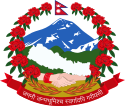House of the States of Nepal
|
National Assembly राष्ट्रिय सभा |
|
|---|---|

Emblem of Nepal
|
|
| Type | |
| Type | |
| Leadership | |
|
Chairperson
|
Ganesh Prasad Timilsina, NCP
Since 15 March 2018 |
|
Vice Chairperson
|
Shashikala Dahal, NCP
Since 18 March 2018 |
| Structure | |
| Seats | 59 |
 |
|
|
Political groups
|
Government (39)
Opposition (13)
Other opposition (4) Others (3)
|
|
Length of term
|
6 years |
| Elections | |
| Indirect single transferable vote | |
|
Last election
|
06 February 2018 |
|
Next election
|
2024 |
| Meeting place | |
 |
|
| International Convention Centre, New Baneshwor, Kathmandu, Nepal | |
| Website | |
| na |
|
Government (39)
Opposition (13)
Other opposition (4)
Others (3)
The National Assembly (Nepali: राष्ट्रिय सभा; Rastriya Sabha) is the upper house of the bicameral Federal Parliament of Nepal, the lower house being the House of Representatives. The composition and powers of the Assembly are established by Part 8 and 9 of the Constitution of Nepal. There are a total of 59 members: 8 members are elected from each of the seven states by an electoral college of each state, and three are appointed by the President on recommendation of the government.
Members serve staggered six year terms such that the term of one-third members expires every two years.
The National Assembly under the 1990 Constitution was dissolved on 15 January 2007 and replaced by a unicameral Interim Legislature. Following two Constituent Assembly elections which also served as an unitary Legislature Parliament, the Constitution of Nepal provisioned for a National Assembly as an upper house.
Mahasabha (Nepali: महासभा) was the Upper House of the bicameral Parliament of Kingdom of Nepal during 1959 - 1962.
The Revolution of 1951 made the process to enact a new constitution entitled Interim Government of Nepal Act 1951, which was able to transfer all executive powers back to the Shah kings from Rana regime.
King Mahendra was unable to resist the increasingly well-orchestrated political demands by the Nepali National Congress for a more democratic and representative government, and was forced to promulgate a new constitution.
The Constitution of the Kingdom of Nepal, 1959 proclaimed on 12 February 1959. The constitution describes about Mahasabha (Nepali: महासभा) as below:
...
Wikipedia
